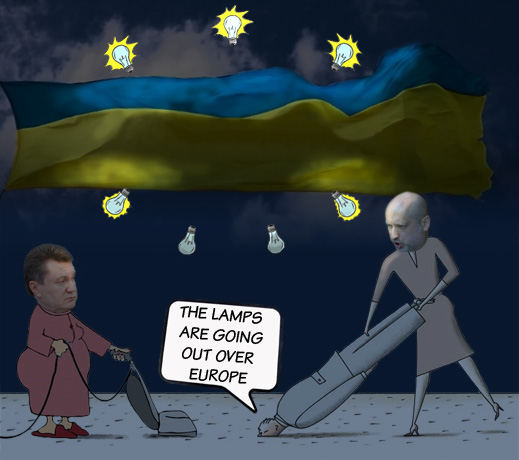
By John Helmer, Moscow
In most legal codes there is no concept of a legal vacuum, since lawyers, judges and experts on jurisprudence everywhere believe that for every act some law or other must apply. In English and American law, for example, it is inconceivable – to lawyers, judges, politicians and policemen – that the law ceases to have application. It is possible, they admit, that there are situations which are so novel in fact, or so unprecedented, the statutes, regulations, and decided case law haven’t caught up with the realities. But catch up the legislators and judges do. These aren’t vacuums, so much as gaps which are invariably plugged.
What happens if a government or a legislature, acting beyond its authority, gets a court to rule in violation of its constitution? That isn’t a vacuum. It is double-barrelled unlawfulness or illegality. But since the fingers on the trigger didn’t have the authority to pull, the outcome is what the lawyers call a legal nullity. It doesn’t require challenge or appeal. It is void from the start. For examples in international law of what the doctrine of nullity means, read on [1]. For an interpretation of a legal vacuum by the Russian Constitutional Court, click here [2].
On Friday, March 14, the Ukrainian Constitutional Court issued what it claims to be its decision on the application by Ukraine’s acting president, Alexander Turchynov (image, right), and the parliament, Verkhovna Rada, to judge whether the Crimean referendum was within the powers of the Crimean government and parliament to hold, and of Crimean voters to decide. The court convened its hearing on Friday morning. In the early evening, the court issued a press release [3] claiming a hearing had commenced.
Later the same evening, a 10-page text of the court’s decision was issued. Written by two of the fifteen judges who are reported to have participated, the published text [4] was in the Ukrainian language. The court has yet to publish a Russian-language version; it stopped publishing in Russian on March 6. Here [5] is a rough, unofficial translation into English of the Constitutional Court’s document.
There is no indication how — or indeed if — each of the 15 judges ruled. The operative part of the document acknowledged the right of the Crimean parliament and citizens to hold referendums under Article 138, section 2. But that right, according to the March 14 document, “shall not contradict the Constitution and laws of Ukraine and adopted in accordance with the Constitution of Ukraine and laws of Ukraine, the acts of the President of Ukraine and the Cabinet of Ministers of Ukraine and on their implementation (Article 135 of the Basic Law of Ukraine).” The court document also decided that “the question of changing the territory of Ukraine can be resolved only by national referendum (Article 73 of the Constitution of Ukraine).”
Accordingly, it was concluded that the Crimean authority “violated the constitutional principle of territorial ‘integrity of Ukraine and went beyond its powers, and therefore does not comply with Resolution of Articles 1, 2, 5, 8, the second paragraph of Article 19, Article 73, paragraph 3 of Article 85, paragraphs 13, 18, 20 of Article 92, Articles 132, 133, 134, 135, 137, 138 of the Constitution of Ukraine.” Thus, the decisions of the Crimean parliament and council of ministers to conduct the referendum were “unconstitutional”. This decision “is binding on the territory of Ukraine, is final, and cannot be appealed.”
On Sunday, the referendum was implemented in Crimea. The official ballot count indicated that 81.3% of eligible voters participated. Of these, 96.8% voted in favour of acquiring the rights of a subject of the Russian Federation; 2.5% for preserving Ukrainian sovereignty under the 1992 Ukrainian Constitution.
In response, the acting prime minister in Kiev, Arseny Yatseniuk, said those responsible for the act of separation would be prosecuted for criminal acts. The US White House announced [6]: “We reject the ‘referendum’ that took place today … [It] is contrary to Ukraine’s constitution, and the international community will not recognize the results of a poll administered under threats of violence and intimidation from a Russian military intervention that violates international law.”
The Russian Ambassador to the United Nations, Vitaly Churkin, had described [7] the referendum in a speech to the Security Council as having a greater legal authority than the decisions of executive, legislature, or judiciary in Kiev. “It is clear that the implementation of the right of self-determination in the form of separation from the existing state is an extraordinary measure. In Crimea such a case apparently arose as a result of a legal vacuum, which emerged as a result of unconstitutional, violent coup d’état carried out in Kiev by radical nationalists, as well as direct threats by the latter to impose their order on the whole territory of Ukraine.”
By legal vacuum, Churkin meant there had been a breakdown of constitutional authority in Kiev from February 21. This was also the position of the Crimean Council of Ministers towards declarations of acting president Turchynov preceding last Friday’s Constitutional Court session. In short, Turchynov’s declarations were nullities.
“We explain”, declared [8] the Crimean government, “that under part two of Article 137 of the Ukrainian Constitution, the Ukrainian president may suspend the legal acts passed by the Supreme Council of the Autonomous Republic of Crimea on the basis of their inconsistency with the Ukrainian laws by asking the Ukrainian Constitutional Court to rule on their constitutionality. Since no such decree by the Ukrainian acting president has until now been duly issued and unveiled, and no constitutional filing regarding the constitutionality of the ARC [Autonomous Republic of Crimea] Supreme Council’s resolution of March 6, 2014, ‘On holding the Crimean referendum’ has been submitted to the Constitutional Court, the statements by Ukrainian Acting President Oleksandr Turchynov are worthless and have no legal implications.’”
Much hangs, and a good many nullities, on what exactly happened at the Constitutional Court in the days and hours before the Friday document was issued.
The spokesman for the court, Gennady Chernenko, acknowledges it was impossible under the quorum rules of the court for there to be any hearing or decision on Turchynov’s claim until Friday. That problem, the court spokesman also admitted, began on February 24, shortly after Turchynov assumed presidential powers, appointed Yatseniuk prime minister with a cabinet of others voted by the Verkhovna Rada, and together agreed to the dismissal of five Constitutional Court judges.
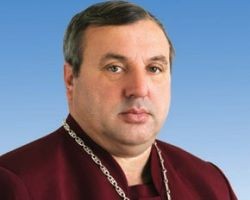 The five dismissed immediately by a vote of the Verkhovna Rada were the court’s chairman Vyacheslav Ovcharenko (right), and four others – Anatoly Holovin, Mykhailo Kolosa, Maria Markush, and Oleksandr Paseniuk.
The five dismissed immediately by a vote of the Verkhovna Rada were the court’s chairman Vyacheslav Ovcharenko (right), and four others – Anatoly Holovin, Mykhailo Kolosa, Maria Markush, and Oleksandr Paseniuk.
At Title XII [9], the Ukrainian Constitution sets out the requirements for the Constitutional Court. The number of judges is fixed at 18 comprising three quotas. Six must be appointed by the President; six by the Verkhovna Rada; and six by the legal profession acting through the Ukrainian Congress of Judges. One of the presidential appointees retired last autumn, and President Victor Yanukovich (lead image, left) hadn’t replaced him by the time he was ousted on February 21.
Once parliament sacked the five, the remaining bench comprised just 12. It was also proposed by the deputies that Turchynov should dismiss two judges from the presidential quota – Deputy Chairman Yury Baulin, who had been appointed [10] in 2008 by President Victor Yushchenko; and Judge Sergei Vdovychenko, another appointee of Yushchenko’s in 2008 [11].
At the same time, the Verkhovna Rada sent a request [12] to the Congress of Judges to convene within three days and vote to dismiss five of its appointed quota – Vasyl Bryntsev (below 1), Mykhailo Hultai (2), Natalia Shaptala (3), Oleg Serheichuk (4), and Mykhailo Zaporzhets.
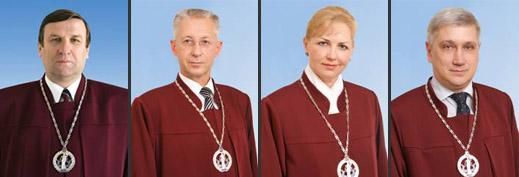
Their court biographies can be read here [13]. With the exception of Bryntsev who was appointed in 2005 (Yushchenko) , the other judges were all named by the judicial congress held in September 2010, when Yanukovich was seven months into his presidency.
The newly appointed General Prosecutor was ordered by the Verkhovna Rada to open criminal investigations against all the names on the proscription list for the court. The Congress of Judges refused to meet under these conditions. Instead it decided to postpone a new congress until April 7. For the time being, Bryntsev and his four colleagues are hanging on to their seats.
The Ukrainian Constitution protects the Constitutional Court judges by granting them a single, non-renewable term of 9 years, with “guarantees of independence and immunity”. Art. 126 provides “the independence and immunity of judges shall be guaranteed by the Constitution and laws of Ukraine. Any influence on judges shall be prohibited.” The order to start criminal proceedings against the judges, issued by the Verkhovna Rada on February 24, appears to have been a violation of Art. 126.
Art. 126 is vague on the grounds for dismissal, and doesn’t require a criminal indictment, due process, or guilty verdict in a criminal court. The provision does make the judges dependent on the authority of their appointor – president, parliament, or judicial congress. Apart from age, disability, or resignation, the three grounds of culpability for dismissal are identified in the constitution as “violation by the judge of requirements concerning incompatibility; a breach of oath by the judge; the entry into legal force of a verdict of guilty against him.”
There wasn’t time for Turchynov and Yatseniuk to despatch the judges they wanted to sack by trying them and convicting them on a criminal offence, according to the regular court procedure. They were accused instead of “a breach of oath” in relation to their ruling on the presidential and parliamentary powers in the constitutions of 2004 and 2010. That charge was decided by the Verkhovna Rada during the February 24 debate, without a defence entered by the judges or their representatives. The action appears to have been a violation of the independence guarantee, and the vote to dismiss, a violation of Art. 128: “protection of the professional interests of judges shall be provided in compliance with a procedure established by law.”
In January 2013 the European Court of Human Rights examined the legality of such “breach of oath” proceedings in Ukraine, and ordered [14] the reinstatement of a judge, Alexander Volkov, to his Supreme Court post, with payment of damages. “The violations found in the case suggest that the system of judicial discipline in Ukraine has not been organised in a proper way, as it does not ensure sufficient separation of the judiciary from other branches of State power. Moreover, it does not provide appropriate guarantees against abuse and misuse of disciplinary measures to the detriment of judicial independence, the latter being one of the most important values underpinning the effective functioning of democracies.”
The European Court found particular fault with the conduct of the Verkhovna Rada: “the parliamentary vote on the decision to remove the applicant from office was not lawful in terms of domestic law.”
Had Turchynov removed Baulin and Vdovychenko on February 24, the Constitutional Court would have been unable to judge anything, as its quorum would have been reduced to 10. Chernenko, the court spokesman, concedes, that “after the dismissal of the five judges the Constitutional Court of Ukraine did not hold plenary sessions, as there was no quorum required for this (a minimum of 12 judges). It is in the plenary, according to the Rules of Court, that decisions [judgements] are made. I note that the even after the dismissal of the five judges, a quorum remained, but some judges in this period were missing for various reasons. That is, the Court was not able to consider cases under these circumstances.”
This didn’t matter to Turchynov and Yatseniuk in Kiev on February 24. It did matter to them on March 6, after the Crimean referendum was announced in Simferopol. As the Crimeans pointed out to Turchynov, without a ruling from the Constitutional Court, the referendum was as constitutional as Title X and Art. 138 said it was. Turchynov now needed Baulin and Vdovychenko to remain on the bench, so long as they could be induced to vote against the referendum.
As Cherynenko now admits, several judges kept away from the court so that there could be no quorum, and no ruling on the Crimean question. On March 12, just four days before the referendum was scheduled, the Verkhovna Rada attempted to appoint five new judges. This required a bare majority of 226 votes of the chamber. One of the five fell short; four passed — Serhii Sas (below 1), Stanyslav Shevchuk (2), Mykola Melnyk (3), and Ihor Slydenko (4).
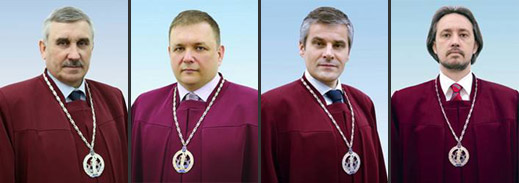
They took their judicial oath on March 13. So rapidly were they put on the bench, the court website was able to include the names in its Ukrainian list, but without their biographies. When last Friday dawned, there were 16 judges, according to the Ukrainian version of the court website; 13, according to the Russian; and just 12, according to the English.
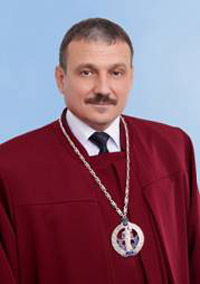 Among the refusenik judges, just one, Alexander Kasminin (right) was absent from the Friday session called to hear the Crimean referendum case. Kasminin was born in Poltava, in eastern Ukraine, between Kharkov and Dniepropetrovsk. Before his appointment to the Constitutional Court in 2013 he had spent most of his legal career in his home town.
Among the refusenik judges, just one, Alexander Kasminin (right) was absent from the Friday session called to hear the Crimean referendum case. Kasminin was born in Poltava, in eastern Ukraine, between Kharkov and Dniepropetrovsk. Before his appointment to the Constitutional Court in 2013 he had spent most of his legal career in his home town.
When the quorum was assembled last Friday, Baulin presided. The court announcement [15] reveals that just two presentations were made – by Judges Peter Stetsiuk and Alexander Tupytskyi. Stetsiuk is from the western Ukraine and spent most of his career in Lviv. Tupystkyi was born in the west, and served in courts in cities of both west and east. After they made their presentations, the judges adjourned to make their decision in camera. Recorded officially as represented in the courtroom were members of the Kiev government, the Verkhovna Rada, and the press. There was no presentation by lawyers or representatives of Crimea.
Explaining for the court, Chernenko says the hearing procedure did not “provide for oral presentations by any representatives.” He added that “among the documents which the judges considered at this meeting, there were no appeals in defence of the referendum.”
The court document summarizes the claims of the two applicants, the acting president and the Verkkovna Rada. Since the Crimea was unrepresented in the proceeding, there is no reference to its arguments for the constitutionality of the referendum; its contention that the acting president lacked legal standing to apply to the court; and its case that the proceedings against the court judges amounted to unlawful intimidation prior to the Friday’s hearing. No case law, neither domestic nor international, is cited in support of the conclusions.
One paragraph appears to have been written into the court document without reference to the constitutional and legal issues surrounding the referendum. This is section 4.4. “The resolution is also contrary to the fundamental principles of sovereignty and territorial INTEGRITY enshrined in international instruments, in particular the principle of mutual respect for the sovereign equality of each state, including political independence, the ability to change the borders in accordance with international law, by peaceful means and by agreement. As a result of these principles, States Parties shall refrain from violating the territorial integrity or political independence of any state by use of force or threat of force or in any other manner inconsistent with the Purposes of the United Nations, as well as actions aimed against the territorial integrity or the unity of any State Party (The United Nations Charter, the Final Act of the Conference on Security and Cooperation in Europe in 1975, the Framework Convention for the Protection of National Minorities, 1995).”
The reference to what “States Parties shall refrain from [doing]” isn’t what a judge, or 15 of them, would have composed in this context. It appears to have been dictated at the Russian Government by someone in Kiev who wasn’t a party to the referendum proceeding.
Chernenko, the court spokesman, was asked to say whether judges on the court believe that since February 24 they have been subject to intimidation; and whether the constitutional guarantees of their independence and immunity have been violated by threats of dismissal and criminal indictment. He replied that on March 12, two days before the Crimean referendum hearing, the full court addressed an appeal to the Verkhovna Rada. This “refers to attempts to undermine the independent status of judges and the threat of criminal prosecution. The judges noted that the action of the Parliament and Prosecutor General do not correspond to Art. 126 of the Constitution, which guarantees the independence and immunity of judges and forbids any influence on them.”